第9章 II THE MANIAC(6)
The determinist does not believe in appealing to the will, but he does believe in changing the environment. He must not say to the sinner, "Go and sin no more," because the sinner cannot help it. But he can put him in boiling oil; for boiling oil is an environment.
Considered as a figure, therefore, the materialist has the fantastic outline of the figure of the madman. Both take up a position at once unanswerable and intolerable.
Of course it is not only of the materialist that all this is true.
The same would apply to the other extreme of speculative logic.
There is a sceptic far more terrible than he who believes that everything began in matter. It is possible to meet the sceptic who believes that everything began in himself. He doubts not the existence of angels or devils, but the existence of men and cows.
For him his own friends are a mythology made up by himself.
He created his own father and his own mother. This horrible fancy has in it something decidedly attractive to the somewhat mystical egoism of our day. That publisher who thought that men would get on if they believed in themselves, those seekers after the Superman who are always looking for him in the looking-glass, those writers who talk about impressing their personalities instead of creating life for the world, all these people have really only an inch between them and this awful emptiness. Then when this kindly world all round the man has been blackened out like a lie; when friends fade into ghosts, and the foundations of the world fail; then when the man, believing in nothing and in no man, is alone in his own nightmare, then the great individualistic motto shall be written over him in avenging irony. The stars will be only dots in the blackness of his own brain; his mother's face will be only a sketch from his own insane pencil on the walls of his cell.
But over his cell shall be written, with dreadful truth, "He believes in himself."
All that concerns us here, however, is to note that this panegoistic extreme of thought exhibits the same paradox as the other extreme of materialism. It is equally complete in theory and equally crippling in practice. For the sake of simplicity, it is easier to state the notion by saying that a man can believe that he is always in a dream. Now, obviously there can be no positive proof given to him that he is not in a dream, for the simple reason that no proof can be offered that might not be offered in a dream.
But if the man began to burn down London and say that his housekeeper would soon call him to breakfast, we should take him and put him with other logicians in a place which has often been alluded to in the course of this chapter. The man who cannot believe his senses, and the man who cannot believe anything else, are both insane, but their insanity is proved not by any error in their argument, but by the manifest mistake of their whole lives. They have both locked themselves up in two boxes, painted inside with the sun and stars; they are both unable to get out, the one into the health and happiness of heaven, the other even into the health and happiness of the earth. Their position is quite reasonable; nay, in a sense it is infinitely reasonable, just as a threepenny bit is infinitely circular. But there is such a thing as a mean infinity, a base and slavish eternity. It is amusing to notice that many of the moderns, whether sceptics or mystics, have taken as their sign a certain eastern symbol, which is the very symbol of this ultimate nullity. When they wish to represent eternity, they represent it by a serpent with his tail in his mouth. There is a startling sarcasm in the image of that very unsatisfactory meal.
The eternity of the material fatalists, the eternity of the eastern pessimists, the eternity of the supercilious theosophists and higher scientists of to-day is, indeed, very well presented by a serpent eating his tail, a degraded animal who destroys even himself.
This chapter is purely practical and is concerned with what actually is the chief mark and element of insanity; we may say in summary that it is reason used without root, reason in the void.